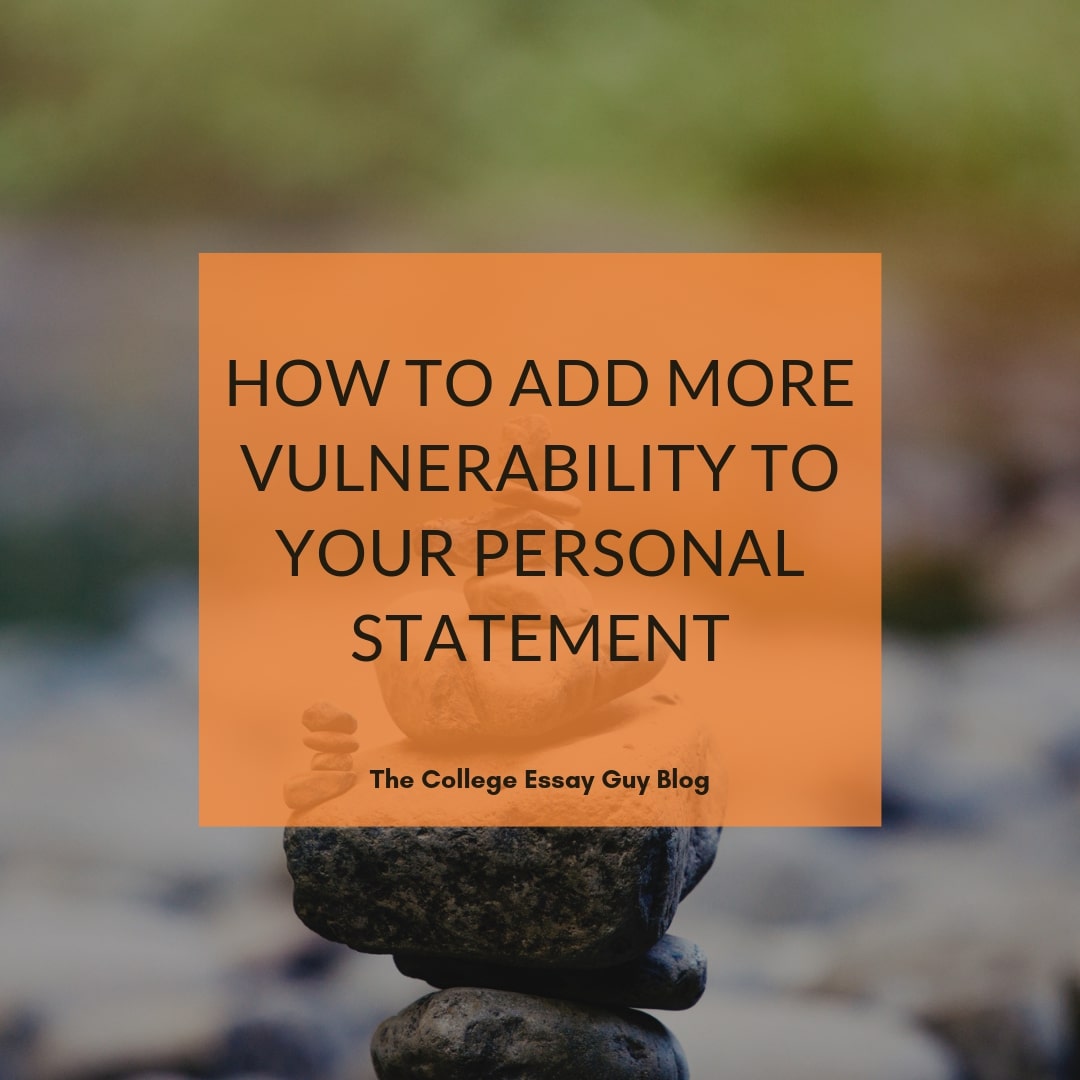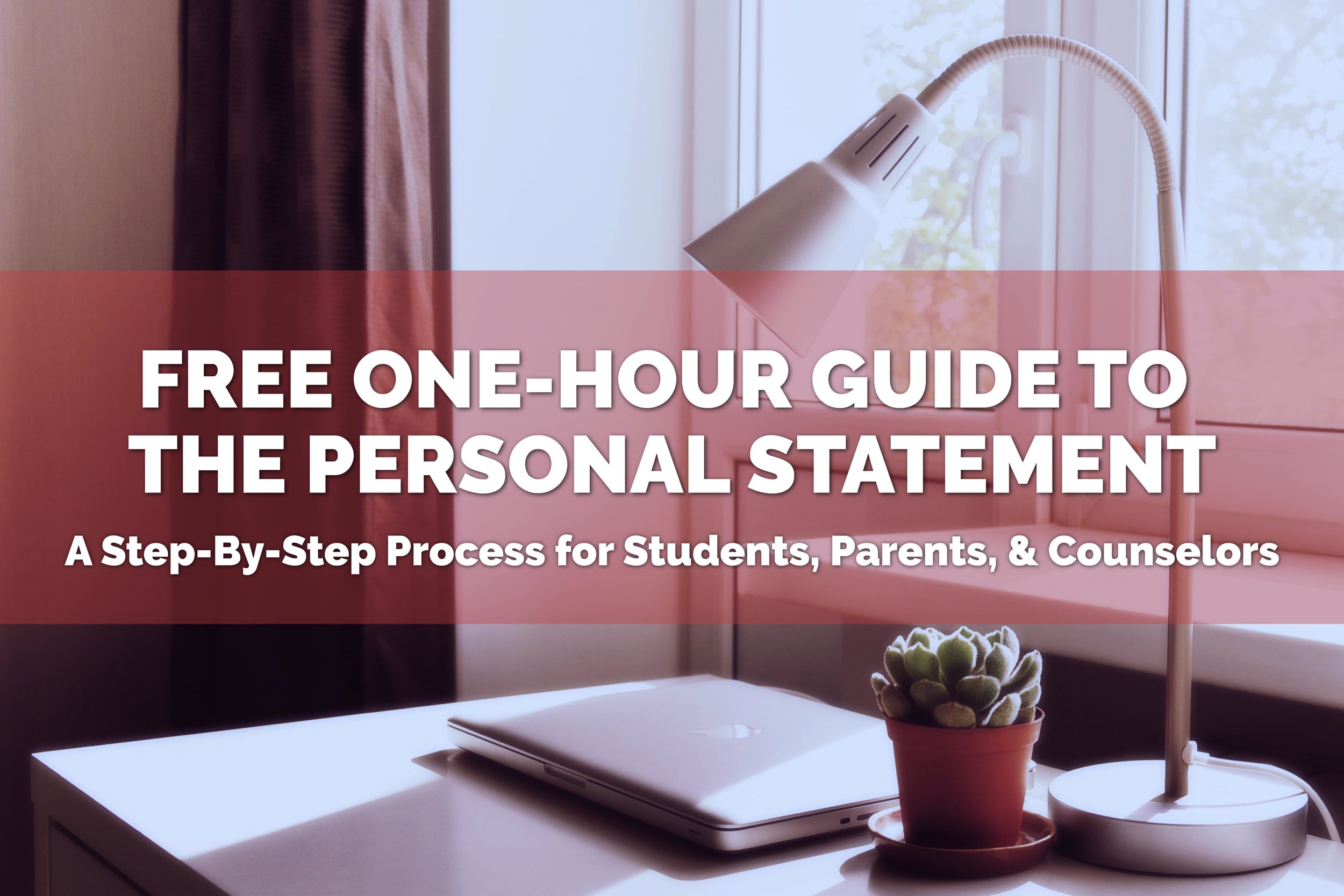Are you pushing away from your desk as you read this title? Considering closing your laptop?
If you are, I’m not surprised. Vulnerability can feel scary. It’s soooo much easier to focus on surface-level accomplishments than deeply rooted insecurities. Opening up allows other people to be let in. But opening ourselves up? Sharing our struggles or failings or emotionally exposed moments? That can feel terrifying.
Well, I’m here to tell you: truly great personal statements are very often vulnerable. The vulnerable place is, I believe, where the magic happens. Venture down the path of vulnerability and who knows where it might lead, but chances are it will be somewhere interesting.
Luckily for all of us, there are several different ways to do this in your essay--and they don’t all involve sharing that humiliating story from scout camp.
5 Ways to Be Productively Vulnerable In Your Personal Statement
1. Reveal something that you worry people might judge you for.
Sometimes we worry that revealing something may lead us to feel isolated, ashamed, or unloved. But often I find vulnerability can have the opposite effect. When we admit we disagree with someone we admire, discuss our deepest fears, or even speak up about something we care about, we can draw people closer to us because sharing our regrets, our insecurities, and our far-fetched dreams for the future are how we find common ground to unite us in understanding.
Ashamed by something someone in your family did? It happens. Embarrassed by something you said you’d do, then didn’t? Been there. Afraid of looking like a fool? Wait, wasn’t that most of junior high--for all of us? If you’re not sure where to begin, consider the topics that you usually shy away from. What are things you only discuss with close friends? Can you write about those topics in a way that you’re (at least somewhat) comfortable with?
Some common, vulnerable topics include: challenging familial relationships, health issues, frequent moves or immigration, struggles with identity, failures, missteps and moral or ethical conflicts.
If you’re not sure that you’re ready to talk about these things, think about some of your favorite films or books. Often it’s the vulnerable acts that draw us in and help us see our common humanity. The choice to be vulnerable is brave and dynamic.
2. Discuss a challenge or contradiction that is unresolved or unsolvable
You don’t have to share only the parts of yourself you already understand; you can also share the parts that you’re still figuring out… and doing so can be reveal a lot about who you are and how you process the world.
Where can you search for your own unresolved challenges or contradictions? Often, these are the result of a conflict between important values. For example, I want to support local, independent businesses (value: community), but this is at odds with my desire to have everything delivered to my door in just a few hours or days via Amazon Prime (values: freedom, convenience).
See what I mean? This concept of conflicting values is actually the essence of drama. Drama doesn’t exist if you hate X but love Y. Drama exists when you love two things that are in opposition. There’s no drama if I love shopping local and hate opening packages, since the choice is simple there: don’t order things through Amazon. Drama exists when I love opening boxes of reasonably-priced sweat socks, but I also want to support the mom and pop shoe store down the street.
For a great brainstorming exercise on challenges, check out this video.
In terms of your essay, these types of conflict can create productive tension.
How can you discover these conflicts for yourself? Consider which of your core values are sometimes at odds with each other. Can you have integrity while taking risks? Can you be a good listener while also sharing your story? Can you be proud of your identity as a first-generation American while also embracing the American way of life?
Sometimes we encounter conflicts that aren’t just unresolved, but are actually unsolvable. And that’s fascinating.
3. Geek out about something you love that's kind of unconventional.
I’m not talking about your passion for volunteer work or team sports. I’m talking about things you like that not everyone “gets.”
How does this show vulnerability? It takes guts to stand up and say what you love, especially if your passion is something other people might consider nerdy. (I say this with love: I am a nerd too—for college essays, board games, and puns).
But it’s possible to scream to the heavens “I LOVE CODING!” unapologetically and some people will love you for it.
But here’s the key: You can’t just say “I love coding so so so much.” You still need to make sure that your essay reveals core values, includes “so what” moments of insight, and is well-crafted.
4. Discuss a challenge or failure and don’t resolve it at the end.
It feels good to tie things up in a neat bow. Examples:
“And that’s how I learned to trust myself and my instincts”
“...but it all worked out because that’s how I got where I am now”
“It all worked out for the best, though, because…”
But that ain’t real life.
One of my all-time favorite essays is about how the author failed to reach one of the students in his after-school tutoring program. He walks us through all the things he did to help this student and how the student eventually dropped out.
The essay ends with this paragraph:
This wasn’t Alex’s fault. It was mine. I had failed as a teacher. Because, at the end of the day, our goal was simple: get these kids out of Chicago’s hood. Achieve First was their path into a new world of education and achievement. I was a guide on that path. But for Alex, I had failed.
And that’s a heavy burden.
Annnnnd that’s it. No neat bow, no glib “here’s what I learned.” But throughout the essay I still learn a lot about this student’s core values--his commitment to social justice, to helping others, to tackling tough questions--and the essay is loaded with “so what” moments.
5. Complete the Feelings & Needs Exercise.
To practice being vulnerable, try my Feelings & Needs exercise. To start, pick something that really bothers you about someone you know. For instance, maybe you feel that a friend doesn’t really listen to you or that your coach doesn’t treat you equally compared to other members of your team. Bonus points: once you’ve finished the exercise, go tell the person how you feel and what your deeper needs are. (If your hands getting all sweaty just thinking about it, that means you’re probably doing it right.)
And even if the topic you choose to explore through the Feeling and Needs exercise doesn’t end up being your personal statement topic, it should give you a pretty good reference point for what vulnerability feels like.









